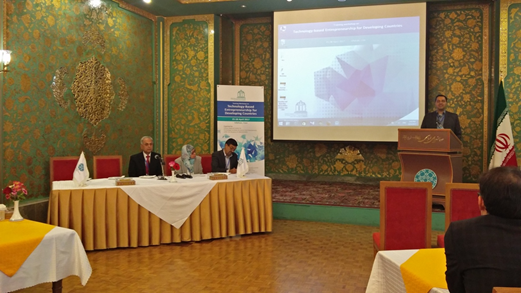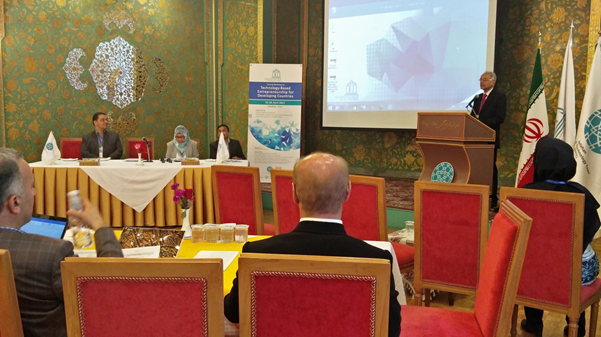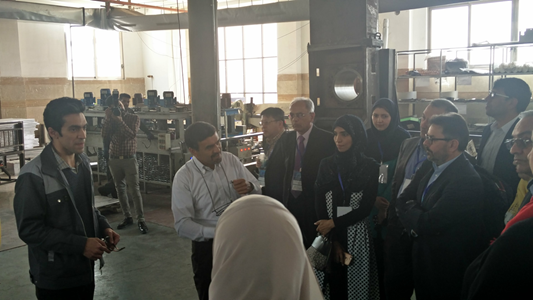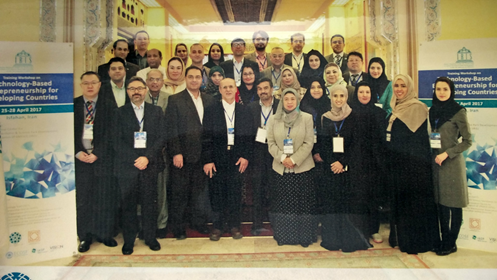IRIS-ISTT-ECOSF-ISTIC hold joint International Workshop on “Technology-Based Entrepreneurship for Developing Countries” in Isfahan-Iran, April 25–28, 2017
Go Back

Isfahan Regional Center for Technology Incubators & Science Parks Development under the auspices of UNESCO (IRIS), Isfahan Science and Technology Town (ISTT), ECO Science Foundation (ECOSF) and the International Science, Technology and Innovation Centre for South-South Cooperation under the Auspices of UNESCO (ISTIC) in Malaysia, joined together to hold an International Workshop on “Technology-Based Entrepreneurship for Developing Countries” with collaboration of International Association of Science Parks and some private agencies. The Workshop was inaugurated in Isfahan, Iran on 25 April and went on till 28 April, 2017.

The purpose of this workshop was to impart knowledge on how to commercialize scientific and technological research among participants from developing countries with a goal to innovate and develop patents. Thus helping them create an environment and build an understanding of process of commercialization with active engagement of universities and R&D organizations. The workshop provided an opportunity to the participants to familiarize with the elements of entrepreneurship in relation to the technological development. The workshop also served as a platform to learn a practical approach on how to help create and build successful technology-driven businesses. The workshop attracted a number of participants from diverse background from developing countries including Bangladesh, Iran, Iraq, Kazakhstan, Kyrgyzstan, Oman and Tajikistan. Experts from Iran, Italy and Malaysia were the trainers. From ECOSF Engr. Khalil Raza joined the workshop and also led one of the group of participants in developing business proposal. ECOSF sponsored the participation from ECO member countries other than the hosts- Iran.
The workshop was opened by Dr. M. Javed Omidi, Director IRIS, who gave a brief introduction on aims and objectives of the workshop. Dr. Omidi stated that IRIS since its establishment has maintained a healthy track record for promoting Small Medium Enterprises (SMEs) and Startup Companies related to the technology development in Iran. Dr. Omidi also highlighted the significance of this workshop; that is to expose the participants with an impact on technological based business development, idea validation, opportunity assessment, business models, business planning and financing.

Dato’ Dr. Sharifah Maimunah, Director ISTIC, in her welcome address appreciated the efforts by organizing partners in holding this workshop. Such initiatives are most needed for developing countries, she added. The workshop will provide an opportunity for participants from various developing countries to promote the technology based entrepreneurship for the countries of south. She also briefed about the key objective and role of ISTIC in promotion of Scientific and Technological research in the region with its flagship programs for the countries of south. Dr. Maimunah also affirmed the role of ECOSF as one of its strategic partners and appreciated its efforts for providing travel grants to participant from the ECO countries.
Prof. Manzoor H. Soomro, in his speech, thanked all the organizing partners including IRIS, ISTT, ISTIC and some local institutions for their sincere contribution towards making this workshop possible. He encouraged all the participants to fully utilize the potential of this workshop and stressed for achieving tangible and fruitful outcomes of this workshop. Prof. Soomro asked for translating this acquired knowledge during the workshop into real business plan with concrete results. Prof. Soomro introduced to participants the ECOSF and its flagship programs and aims & objectives for promotion of STI based economic development in the ECO region. He said that; in a short period of time, ECOSF has done quite well in establishing strategic partnerships with world’s leading organizations and development of its flagship programs including, Inquiry Based Science Education, Engineering Qualification Standardization as well as ICT promotion by engaging youth with a launch of AppIdea2R contest in the region. Scientific community has not been true entrepreneurs but business community has huge potential in translating the scientific work into successful business model. Thus there is a need to integrate these two communities together to create a difference, he said. During the inaugural session, ECOSF and IRIS signed a Memorandum of Understanding (MoU) for collaboration in development S&T Parks, Incubation Centers and promotion of Innovative and Entrepreneurial Initiatives in ECO region.

Dr. Mostafa Karimian Eghbal while briefing the workshop participants on various stages of incubation and technology businesses at the Isfahan Science and Technology Town (ISTT).
It is important to note that despite the unfavorable economic conditions in Iran, it has done quite well in development of S&T sector as compared to other countries in the region. Iran established its first Science and Technology Park in 1993. Since then science and technology parks have played an important role in the development of the country. Currently, there are over 40 S&T parks in Iran. Whereas, Isfahan Science and Technology Town (ISTT) is the pioneering science town and one of the most leading and successful S&T parks in the country. The ISTT provides a conducive environment to research centers, private sector companies, R&D centers of governmental organization to encourage innovation and promote the commercialization of research. ISTT currently hosts more than 470 knowledge based companies.
The workshop included presentations by resource persons, group discussions and business idea contest. The participants also had a chance to visit the Isfahan Science and Technology Town, where they interacted with many young entrepreneurs and had an insight as to how to manage startups and businesses under the S&T parks. The major outcome or key takeaways of this Technology-Based Entrepreneur Workshop are as follows:
Prof. Dr. Azizah Omar, Associate Professor Universiti Sains Malaysia (USM) focused on Strategic Marketing and Branding that is critical to firms and businesses for their success. Dr. Omar emphasized that Marketing is one of the most important factor for any business. Marketing is a measure of the identified market and the profit potential which helps business to explore and deliver value to satisfy the needs of a target market at a profit, she said. Dr. Omar stressed that marketing is the right tool that identifies unfulfilled needs and desires. According to Dr. Omar, a good marketing strategy should be drawn from market research that focuses on right product in order to achieve the maximum profit. She also touched upon various emerging trends in the strategic branding of a company, which is important element to build brand quality.
Mr. Lok Char Lee, School of Management, Universiti Sains Malaysia (USM) emphasized on how to write a winning business proposal and described the key elements that determine a successful business strategy. Mr. Lee explained as to how to identify the master building blocks of business model and enlightened the important steps in the market and business validation process, which are important from the standpoint of strart-up-business models. He also elaborated on the fundamentals of identifying potential business opportunity and services. Mr. Lee described the process of registering a product and its intellectual property rights that includes trademarks, patents and licensing. Mr. Lee elucidated the strategic steps for developing a financial plan which includes determination of revenue forecast, personal plan, budgeting or costing, cash flow assumptions and most importantly identify the sources of funding and its use.
Fabrizio Conicella, Vice President BioPmed Cluster, Italy, delivered his talk on Entrepreneurial Learning and the Growth Process in SMEs. In his presentation, he focused on the innovation in creating successful businesses. Idea creation without innovation doesn’t contribute to the development and to the performance improvement of a company, he said. Mr. Conicella also explained that in the field of biotechnology, projects may lead to a new knowledge with new scientific methods and technical expertise. He stressed that sharing of skills, knowledge, methods, manufacturing, facilities among governments and other institutions is critical to ensure that technological developments are accessible to a wider range of users who can then further develop and exploit the technology into new products, processes, applications, materials or services.
Dr. Mostafa Karimian Eghbal, International Advisor to ISTT and CEO of Vision Consulting Group Iran presented his talk on “Promoting Culture of Entrepreneurship in Iran”. Dr. Eghhbal in his presentation told that a strong linkage between government and industry is a key to promote knowledge based economy for any nation. Dr. Eghbal was of the view that the Tripple Helix Model of University-Industry-Government that aims to transform conventional economic model to knowledge based economic model, as established by the West and the developed world cannot work in the developing world. Thus each country has to assess which economic growth model works for them and they have to establish their own development model. According to him, this is the fundamental reason behind the success of Isfahan Science and Technology Town (ISTT), as we first assessed the needs of our local market and tapped all the available resources by the government-industry-academia to meet those needs, he added. Dr. Eghbal also emphasized on the role of private sector engagement to help build stronger economy for the developing countries. He also stressed that one needs to adopt bottom up approach towards developing the Science and Technology Parks because the centrally governed policies often fail to achieve the desired goals.

The workshop concluded with a group business contest. Participants were invited to pitch their business ideas which they had developed during the workshop with help of resource persons. There were about five groups and each one of them was given a 15 minutes’ time-frame to present their business ideas. All the business ideas were evaluated based on a judging criteria and one of the groups made it to the top. This best ranked business idea aimed to address the water challenges in the developing countries using a cost-effective high-tech biochemical product.